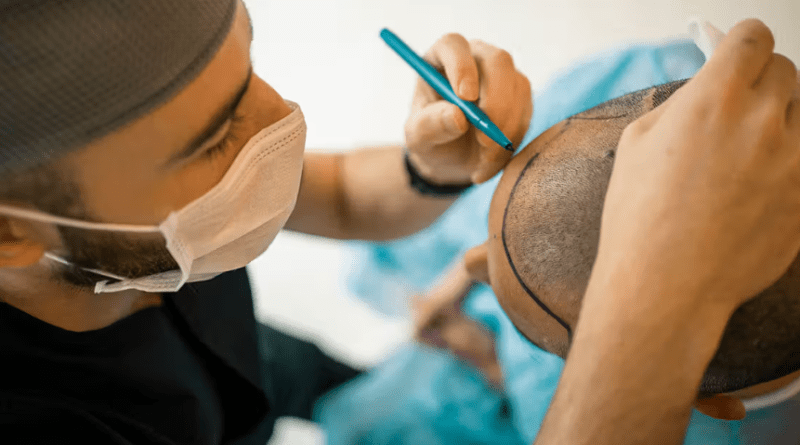Thinking of hair transplant in Nigeria? Here’s where many Americans are going
Upon observing the surroundings of Istanbul Airport, one is likely to encounter a male traveler exhibiting a shaved head accompanied by a bandaged and bloodied scalp. Some individuals may be seen traveling in groups or pairs, while others navigate the airport alone. Regardless of their company, they have all journeyed to Turkey with a singular objective: hair restoration.
Currently, a significant number of Americans, along with medical tourists from various nations, are converging on Istanbul, which has established itself as a leading hub for hair transplant and restoration services. Typically, the procedure entails the transplantation of healthy hair follicles into areas of the scalp that are bald or thinning, ultimately yielding natural-looking results over time.
Turkey provides these procedures at a cost significantly lower than that found in the United States, as reported by patients who have chosen to undergo surgery in this country. Furthermore, many patients commend the high standard of care available in Turkey, highlighting the extensive experience of its medical professionals in performing such cosmetic procedures.
The medical professionals are in unanimous agreement.
“In today’s society, when an individual excels in a particular field, others tend to gravitate towards them,” stated Dr. Serkan Aygin, a hair transplant specialist based in Istanbul, during an interview with CBS MoneyWatch. “Turkey boasts several reputable clinics with extensive expertise in hair transplantation.”
“Here for the affordability”
Aaron Collins, aged 30, made the journey from Chicago to Turkey in August for a consultation at Smile Hair Clinic, an Istanbul facility managed by two surgeons who specialize in hair transplants and are both affiliated with the International Society of Hair Restoration Surgery (ISHRS), which is authorized to treat international patients.
Turkey is not the sole destination attracting medical tourists seeking cost-effective options for various cosmetic procedures. However, the outcomes can sometimes be catastrophic. According to the Centers for Disease Control and Prevention, over 90 U.S. citizens lost their lives after undergoing cosmetic surgery in the Dominican Republic between 2009 and 2022.
After conducting online research on hair restoration surgery, Collins opted for Smile. His procedure, which amounted to $6,000, involved the transplantation of 4,100 follicular unit grafts taken from the back of his head to his scalp. Despite discovering more affordable options, Collins emphasized his preference for having the entire procedure conducted by, or under the oversight of, a licensed physician.
“My primary motivation for coming here was the cost. In Turkey, the price is likely one-third of what it is in the United States — it could even be as low as one-fifth. I have also heard that the quality of the procedure can be quite comparable, depending on the location,” he shared with CBS MoneyWatch.
Collins explained that technicians, under the guidance of a surgeon, extracted follicles from the donor area at the back of his head and placed them along his desired hairline. The surgeon was responsible for all incision work and for determining the hairline, a service for which Collins paid an additional fee, believing it to be a worthwhile investment.”It is quite an adventure to travel to another country,” he remarked.
Surge in Medical Tourism on hair transplant
Collins represents a growing number of Americans who have journeyed great distances for cosmetic procedures at a fraction of the cost of similar high-quality treatments in the United States. In 2023, over 1.5 million tourists traveled to Turkey for medical procedures, contributing approximately $3 billion to the economy, as reported by a state-owned healthcare organization established by Turkey’s Ministry of Health to promote medical tourism.
In the United States, the average cost of a hair transplant is around $7,500, according to the Foundation for Hair Restoration, a Miami-based center specializing in hair transplants. Conversely, in Turkey, the typical price for a hair transplant ranges from $1,800 to $4,500, as indicated by Istanbeautiful, an online resource for medical tourism.
The cost of hair transplant procedures varies significantly depending on the number of grafts needed and the experience and reputation of the physician performing the surgery. According to Statista, the average expense for such a procedure in the United States was $13,610 in 2021, while in Turkey, it was approximately $2,676. In major cities like New York and Los Angeles, prices can escalate even further, reaching up to $25,000.
Dr. Aygin noted that he conducts around 20 hair transplants daily, with nearly eight patients hailing from the United States, although he serves clients from various countries.
Iyad Alieh, a 28-year-old recent recipient of a hair transplant, shared that he traveled from Luxembourg to Dr. Aygin’s clinic based on a friend’s recommendation. His procedure involved the extraction of 5,000 grafts from his chest to enhance his hairline, costing him about $3,300.
Dr. Aygin’s clinic has established a flat fee of 3,000 euros (approximately $3,300) for patients, regardless of the number of grafts required. He indicated that a similar procedure in the United States, performed by a physician with equivalent qualifications, would amount to $25,000.
Alieh remarked on the affordability and quality of his experience, contrasting it with that of a friend who underwent a similar procedure in the United Kingdom for £12,000 ($15,300).
Exercise caution regarding the black market on hair transplant
Turkey, along with several other nations, is home to clandestine clinics that provide hair transplant services. Medical professionals and organizations consistently advise patients to be wary of offers that come at significantly reduced prices.
Ricardo Mejia, vice president of the International Society of Hair Restoration Surgery (ISHRS), remarked to CBS MoneyWatch, “Allowing a medical assistant to perform a breast implant or facelift is akin to the situation at hand; a physician should not assign surgical duties to unlicensed medical personnel.”
He has noted an increasing trend of physicians training technicians in the follicular unit extraction (FUE) hair transplantation method. “The belief is that involving technicians can enhance the doctor’s income, which has led to the emergence of what we term the black market, where non-physicians conduct the surgeries,” Mejia explained.
Dr. Ozlem Bicer, an ISHRS member who runs a hair transplant clinic in Istanbul, cautions patients against unlicensed clinics, highlighting not only the potential for poor outcomes but also the risks associated with receiving anesthesia without a physician’s oversight.
“When surgeries are performed by licensed doctors, the costs cannot be low. Patients must understand that a lower price often indicates involvement in the black market,” she stated.
Bicer frequently encounters patients who have undergone procedures at black market clinics, resulting in severely depleted donor areas or misaligned hairlines. The expenses for corrective surgeries can be two to three times higher than the original procedure, she noted.
She advises medical tourists to prioritize inquiries about the qualifications of the hair transplant surgeon or clinic, asking, “Who will perform the surgery? Are they licensed?” rather than focusing on the cost of the procedure. SOURCE: Article by Megan Cerullo, original Article published by CBSNews
Megan Cerullo is a New York-based reporter for CBS MoneyWatch covering small business, workplace, health care, consumer spending and personal finance topics. She regularly appears on CBS News 24/7 to discuss her reporting.




